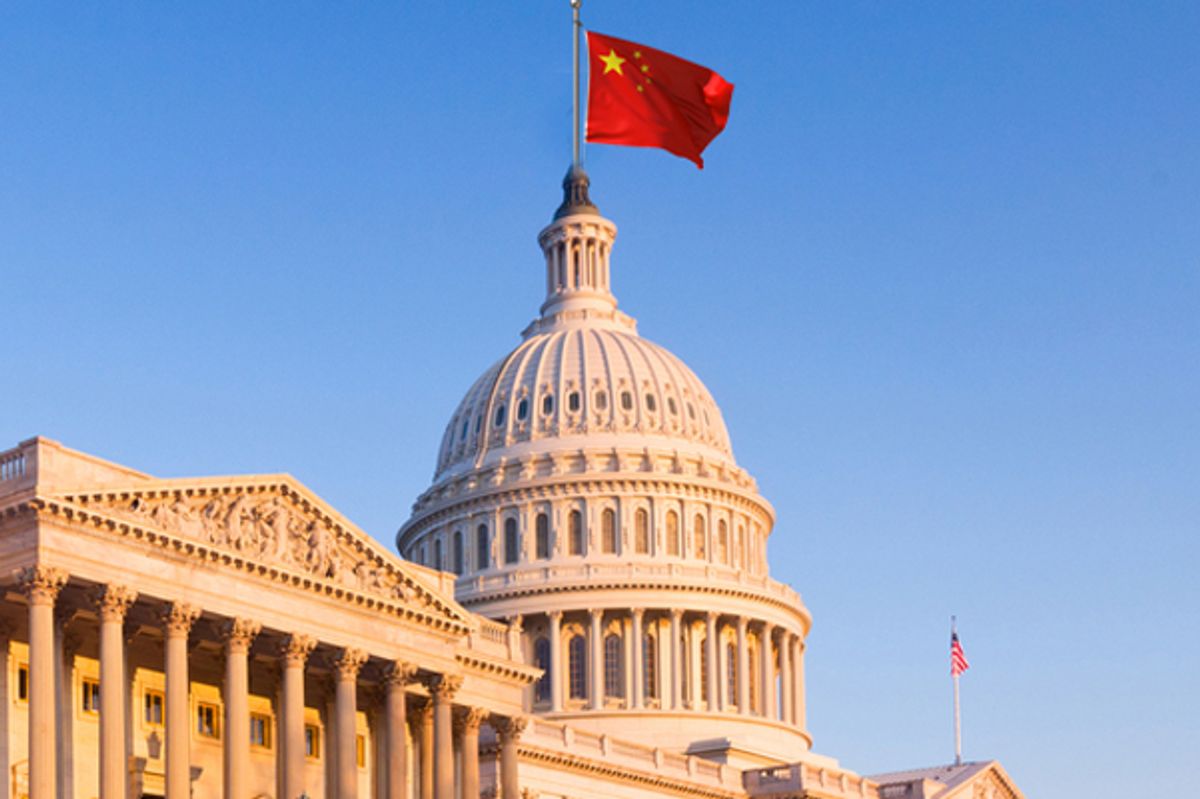Many economic Nostradamuses have long predicted that the epitaph on America's tombstone will ultimately read "Made In China." But casual observers probably didn't think the funeral procession would happen this fast. In the last year, though, most have wised up. Thanks to a spate of mind-blowing headlines, we are learning that the Chinese invasion isn't just a distant possibility -- it's happening right now.
First, in February, ABC News reported that almost every Americana-themed trinket sold in the Smithsonian Institute is made in China. Then news hit that San Francisco is importing its new Bay Bridge from China. Then came the New York Times dispatch about the Big Apple awarding Chinese state-subsidized firms huge taxpayer-funded contracts to "renovate the subway system, refurbish the Alexander Hamilton Bridge over the Harlem River and build a new Metro-North train platform near Yankee Stadium."
Astounding as all of that is, it was quickly topped by news last week reminding us that the new Martin Luther King monument in Washington was designed by a Chinese government sculptor and assembled by low-wage Chinese workers.
The trend is enough to trouble any American. After all, when a memorial for a civil rights leader who deplored "starvation wages" and died supporting a sanitation union's strike is built by non-union serfs from China, it's a good sign there's a big problem.
But then, what exactly is that problem?
Xenophobes will say China's ascendance threatens America's global cultural hegemony and promises to create a dystopia forcing us all to endure the supposed horrors of speaking Mandarin and using chopsticks.
Such misguided and bigoted demagoguery, though, distracts from the real crisis staring at us in our own mirror -- a crisis not of other, but of self. Indeed, for all the fears of external assault, the Chinese invasion tells us the true problem is that America is no longer willing or able to invest in its own future.
This problem is most obvious -- and shocking -- in our government. As opposed to multinational corporations, which care only about maximizing shareholder profit, our public-policy arena is supposed to be focused on building America. But in this golden age of big-money politics, with multinational corporations buying our lawmakers, we get the opposite -- even during an unemployment crisis. Today, municipalities outsource public works projects, congresses water down "Buy America" laws, and presidents champion trade deals that encourage companies to send jobs overseas. That trickles down to give us American iconography made in Chinese factories, American real estate owned by Chinese companies, and American civil rights memorials constructed with Chinese slave labor.
The public excuse from our corrupt politicians is that Americans don't really want the jobs that could be created if lawmakers prioritized domestic investment. Last week, for instance, the White House's U.S. trade representative, Ron Kirk, said we shouldn't be concerned with jobs that are about "making things that, frankly, we don't want to make in America -- you know, cheaper products, low-skill jobs." It was a reprise of 2006, when Sen. John McCain told union members the same thing.
The truth, of course, is the opposite -- millions of jobless Americans are desperate for some shred of economic patriotism that would put them back to work. But our political system isn't about patriotism anymore. It's about the deception embodied in Kirk's talking points.
Thanks to that, the idea of successfully legislating a domestic investment agenda seems not like mere wishful thinking. It seems as wholly inconceivable as walking into a big-box store and finding lots of products that are still made in the USA.
David Sirota is a best-selling author of the new book "Back to Our Future: How the 1980s Explain the World We Live In Now." He hosts the morning show on AM760 in Colorado. E-mail him at ds@davidsirota.com, follow him on Twitter @davidsirota or visit his website at www.davidsirota.com.
COPYRIGHT 2011 CREATORS.COM



Shares